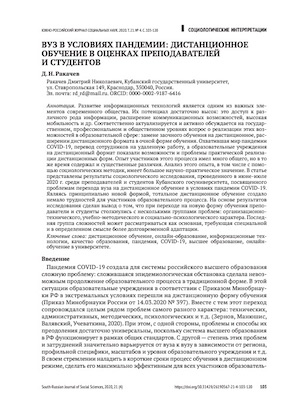Аннотация
Развитие информационных технологий является одним из важных элементов современного общества. Их потенциал достаточно высок: это доступ к различного рода информации, расширение коммуникационных возможностей, высокая мобильность и др. Соответственно актуализируется и активно обсуждается на государственном, профессиональном и общественном уровнях вопрос о реализации этих возможностей в образовательной сфере: замене заочного обучения на дистанционное, расширении дистанционного формата в очной форме обучения. Охватившая мир пандемии COVID‑19, перевод сотрудников на удаленную работу, а образовательные учреждения на дистанционный формат показали возможности и проблемы практической реализации дистанционных форм. Опыт участников этого процесса имел много общего, но в то же время содержал и существенные различия. Анализ этого опыта, в том числе с помощью социологических методик, имеет большое научно-практическое значение. В статье представлены результаты социологического исследования, проведенного в июне-июле 2020 г. среди преподавателей и студентов Кубанского госуниверситета, посвященного проблемам перехода вуза на дистанционное обучение в условиях пандемии COVID‑19. Являясь принципиально новой формой, тотальное дистанционное обучение создало немало трудностей для участников образовательного процесса. На основе результатов исследования сделан вывод о том, что при переходе на новую форму обучения преподаватели и студенты столкнулись с несколькими группами проблем: организационно-технического, учебно-методического и социально-психологического характера. Последняя группа сложностей может рассматриваться как основная, требующая специальной и в определенном смысле более долговременной адаптации.
Ключевые слова
Библиографические ссылки
Агранович, М.Л. (2020). Организация образования в условиях пандемии. Практика стран ОЭСР. Мониторинг экономической ситуации в России. Тенденции и вызовы социально-экономического развития, 9(111), 134–151. Режим доступа https://www.iep.ru/files/text/crisis_monitoring/2020_9–111_April.pdf
Алешковский, И.А., Гаспармшвили, А.Т., Крухмалева, О.В. и др. (2020). Студенты вузов России о дистанционном обучении: оценка и возможности. Высшее образование в России, 29(10), 86–100. DOI: l0.31992/0869-3617-2020-29-10-86-100
Амлаев, К.Р., Кошель, В.И., Ходжаян, А.Б. и др. (2020). Медицинский вуз в условиях пандемии C0VID‑19: новые вызовы и выученные уроки. Медицинское образование и профессиональное развитие, 3(39), 176–185.
Антонова, Н.Н. (2020). Некоторые аспекты организации дистанционного обучения студентов в период пандемии. Мир науки, культуры, образования, 5(84), 8–10.
Белякова, Е.Г. (2020). Онлайн-обучение: In statu nascendi. Профессиональное образование и рынок труда, 2, 45–47.
Букейханов, Н.Р., Гвоздкова, С.И., Бугримова, Е.В. (2020). Оценка эффективности цифровых технологий преподавания в условиях COVID‑19. Российские регионы: взгляд в будущее, 2, 62–75.
Зернов, В.А., Манюшис, А.Ю., Валявский, А.Ю. и др. (2020). Образовательное пространство России после пандемии: вызовы, уроки, тренды, возможности. Научные труды Вольного экономического общества России, 223, 304–322. DOI: 10.38197/2072-2060-2020-223-3-304-322
Инструкция по организации образовательного процесса в связи с профилактическими мерами, связанными с угрозой коронавирусной инфекции (2020). Режим доступа https://www.kubsu.ru/sites/default/files/insert/page/instrukciya_primeneniya_dot.pdf
Клягин, А.В., Макарьева, А.Ю. (2020). Кейсы быстрых реакций вузов в условиях пандемии: Экспресс-выпуск. Москва: НИУ ВШЭ. Режим доступа https://ioe.hse.ru/sao_universitycases
Коморникова, О.М., Попова, Е.И. (2020). Проблемы развития дистанционного образования в России. Вестник Шадринского государственного педагогического университета, 2(46), 111–114.
Минаев, А.И., Исаева, О.Н., Кирьянова, Е.А. и др. (2020). Особенности организации деятельности вуза в условиях пандемии. Современные проблемы науки и образования, 4. Режим доступа: http://science-education.ru/ru/article/view?id=29858
Приказ Минобрнауки России от 14.03.2020 № 397«Об организации образовательной деятельности в организациях, реализующих образовательные программы высшего образования и соответствующие дополнительные профессиональные программы, в условиях предупреждения распространения новой коронавирусной инфекции на территории Российской Федерации». Режим доступа https://www.minobrnauki.gov.ru/documents/? ELEMENT_ID=18515
Тарасова Н.В., Пастухова И.П. (2020). Как влияет сейчас и повлияет в перспективе перевод образовательного процесса в дистанционный режим на образовательные результаты. Режим доступа https://firo.ranepa.ru/novosti/105‑monitoring-obrazovaniya-na-karantine/803‑tarasova-ekspertiza
Торреш, А.П. (1997). Дистанционное обучение. Вестник Финансовой академии, 1, 20–27.
Уроки стресс-теста. Вузы России в условиях пандемии и после неё: Доклад представителей ректорского сообщества на заседании Общественного совета при Министерстве науки и высшего образования РФ 3 июля 2020 г. Режим доступа https://www.minobrnauki.gov.ru/press-center/news/? ELEMENT_ID=21523
Шторм первых недель: как высшее образование шагнуло в реальность пандемии (авт. коллектив А.В. Клягин и др.) (2020). М.: НИУ ВШЭ. Режим доступа https://publications.hse.ru/books/368821814
Юдина Е.Н. (2020). Опыт применения дистанционного образования в вузе. Наука и школа, 5, 37–43. DOI: 10.31862/1819-463х‑2020-5-37-43
Baber, H. (2020). Determinants of Students’ Perceived Learning Outcome and Satisfaction in Online Learning During the Pandemic of COVID‑19. Journal of Education and e-Learning Research, 7(3), 285–292. DOI: 10.20448/journal.509.2020.73.285.292
Bates, A.W. (2005). Technology, E-learning and Distance Education (2nd ed.). New York: RoutledgeFalmer.
Chen, E., Kaczmarek K., Ohyama H. (2020). Student Perceptions of Distance Learning Strategies During COVID-19. Journal of Dental Education, 1–2. DOI: 10.1002/jdd.12339
COVID‑19 Educational Disruption and Response (2020). UNESCO. Retrieved from https://en.unesco.org/node/320920
Knapp, N.F. (2018). Increasing Interaction in a Flipped Online Classroom Through Video Conferencing. TechTrends, 62(6), 618–624. DOI: 10.1007/s11528-018-0336‑z
Maré, S., Mutezo, A.T. (2020). The Effectiveness of E-tutoring in an Open and Distance E-learning Environment: Evidence from the University of South Africa. Open Learning: The Journal of Open, Distance and e-Learning, 1–17. DOI: 10.1080/02680513.2020.1717941
Raviolo, P. (2020). Interazioni e-tutor-studenti e successo formativo: un’analisi dei dati nel contesto dell’educazione superiore online. Excellence and Innovation in Learning and Teaching, 5(2). URL: http://ojs.francoangeli.it/_ojs/index.php/exioa/article/view/10810
Saxena, C., Baber, H., Kumar, P. (2020) Examining the Moderating Effect of Perceived Benefits of Maintaining Social Distance on E-learning Quality During COVID‑19 Pandemic. Journal of Educational Technology Systems, 49(4). DOI: 10.1177/0047239520977798
Telles-Langdon, D.M. (2020). Transitioning University Courses Online in Response to COVID‑19. Journal of Teaching and Learning, 14(1), 108–119.


